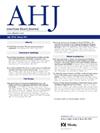Cardiovascular health, lifestyle factors, and social determinants among Hispanic or Latino adults in the United States
IF 3.7
2区 医学
Q1 CARDIAC & CARDIOVASCULAR SYSTEMS
引用次数: 0
Abstract
Background
Among Hispanic/Latino subgroups residing in the US, disparities in cardiovascular health status remain largely uncharacterized.
Methods
This national study used the National Health Interview Survey to assess the burden of cardiometabolic risk factors (hypertension, hyperlipidemia, obesity, diabetes) and cardiovascular diseases (history of heart attack, coronary heart disease, angina, stroke) across Hispanic/Latino subgroups (Mexican, Cuban, Puerto Rican, Central/South American), and the extent to which differences are related to lifestyle factors (physical inactivity, smoking, and alcohol consumption) and/or social determinants of health (income, education, food security, and health insurance status).
Results
The weighted study population included 35,549,841 Hispanic/Latino adults (26,008 respondents). In age- and sex-adjusted models, hypertension was more common among Puerto Rican adults (OR 1.34, 95% CI: 1.12-1.60) but less common among Central/South American adults (OR 0.71, 95% CI: 0.61-0.82) compared to Mexican adults (reference group). Central/South Americans were also less likely to have obesity (OR 0.63, 95% CI: 0.57-0.70) and diabetes (OR 0.50, 95% CI: 0.42-0.61). For cardiovascular diseases, Puerto Rican adults were more likely to have angina (OR 1.69, 95% CI: 1.06-2.71), whereas Central/South Americans were less likely to have angina (OR 0.50, 95% CI: 0.30-0.84), coronary heart disease (OR 0.70, 95% CI: 0.51-0.96), and heart attack (OR 0.49, 95% CI: 0.33–0.72). Moreover, Cuban adults were less likely to have hyperlipidemia (OR 0.73, 95% CI: 0.61–0.88), obesity (OR 0.58, 95% CI: 0.49-0.70), diabetes (OR 0.44. 95% CI: 0.34-0.57) and stroke (OR 0.54, 95% CI: 0.32-0.92) Differences persisted after sequentially adjusting for lifestyle factors and social determinants of health.
Conclusion
This study used disaggregated data to demonstrate the complex landscape of cardiovascular health among Hispanic/Latino adults in the US, emphasizing the need for targeted interventions and policy efforts to reduce health inequities in this rapidly growing population.
心血管健康、生活方式因素和社会决定因素在美国的西班牙裔或拉丁裔成年人中
背景:在居住在美国的西班牙裔/拉丁裔亚群中,心血管健康状况的差异在很大程度上仍未确定。方法:这项全国性研究使用了全国健康访谈调查来评估西班牙裔/拉丁裔亚群(墨西哥人、古巴人、波多黎各人、中美洲/南美洲人)的心脏代谢危险因素(高血压、高脂血症、肥胖、糖尿病)和心血管疾病(心脏病发作史、冠心病、心绞痛、中风)的负担,以及差异与生活方式因素(缺乏身体活动、吸烟、糖尿病、糖尿病)的关系程度。(酒精消费)和/或健康的社会决定因素(收入、教育、粮食安全和健康保险状况)。结果:加权研究人群包括35,549,841名西班牙裔/拉丁裔成年人(26,008名受访者)。在年龄和性别调整模型中,与墨西哥成年人(参照组)相比,高血压在波多黎各成年人中更常见(OR 1.34, 95% CI: 1.12-1.60),但在中南美洲成年人中较少见(OR 0.71, 95% CI: 0.61-0.82)。中美洲/南美洲人患肥胖症(OR 0.63, 95% CI: 0.57-0.70)和糖尿病(OR 0.50, 95% CI: 0.42-0.61)的可能性也较低。对于心血管疾病,波多黎各成年人更容易患心绞痛(OR 1.69, 95% CI: 1.06-2.71),而中美洲/南美洲成年人患心绞痛(OR 0.50, 95% CI: 0.30-0.84)、冠心病(OR 0.70, 95% CI: 0.51-0.96)和心脏病发作(OR 0.49, 95% CI: 0.33-0.72)的可能性较小。此外,古巴成年人患高脂血症(OR 0.73, 95% CI: 0.61-0.88)、肥胖(OR 0.58, 95% CI: 0.49-0.70)和糖尿病(OR 0.44)的可能性较小。95% CI: 0.34-0.57)和中风(OR: 0.54, 95% CI: 0.32-0.92)在对生活方式因素和健康的社会决定因素进行顺序调整后,差异仍然存在。结论:本研究使用分类数据证明了美国西班牙裔/拉丁裔成年人心血管健康的复杂状况,强调需要有针对性的干预措施和政策努力来减少这一快速增长人口的健康不平等。
本文章由计算机程序翻译,如有差异,请以英文原文为准。
求助全文
约1分钟内获得全文
求助全文
来源期刊

American heart journal
医学-心血管系统
CiteScore
8.20
自引率
2.10%
发文量
214
审稿时长
38 days
期刊介绍:
The American Heart Journal will consider for publication suitable articles on topics pertaining to the broad discipline of cardiovascular disease. Our goal is to provide the reader primary investigation, scholarly review, and opinion concerning the practice of cardiovascular medicine. We especially encourage submission of 3 types of reports that are not frequently seen in cardiovascular journals: negative clinical studies, reports on study designs, and studies involving the organization of medical care. The Journal does not accept individual case reports or original articles involving bench laboratory or animal research.
 求助内容:
求助内容: 应助结果提醒方式:
应助结果提醒方式:


